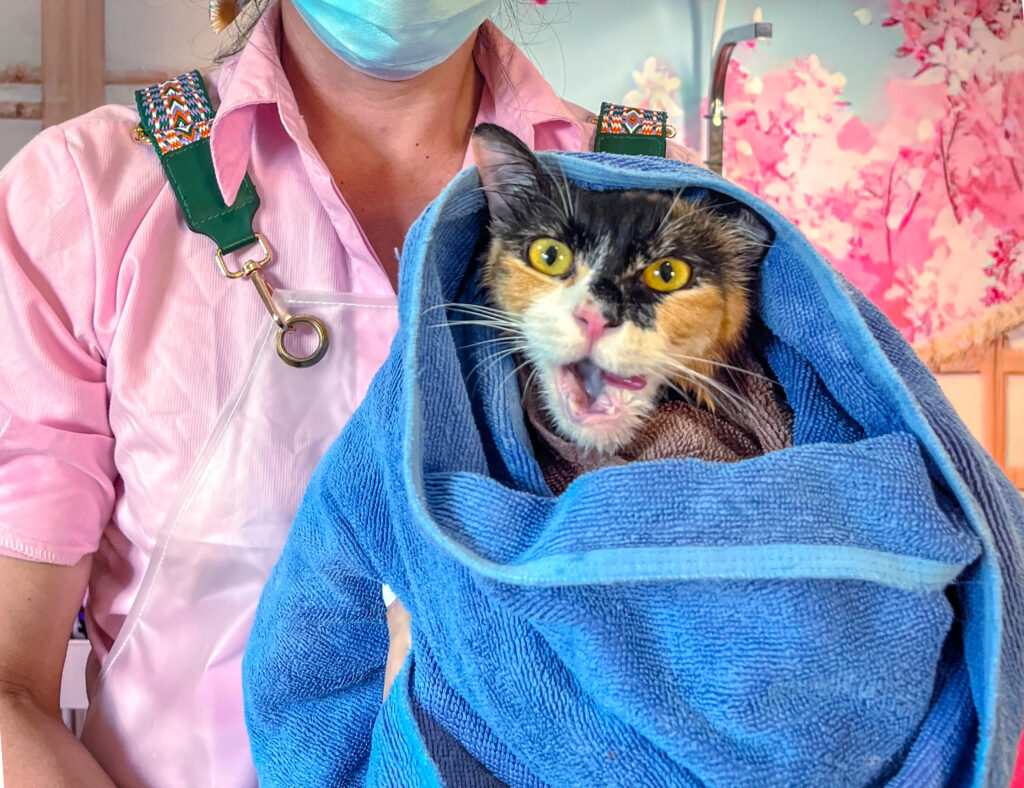Cat grooming tips aren’t just about appearances — they’re a key part of keeping your cat healthy, clean, and comfortable. From brushing to bathing, nail trimming to dental care, this complete guide helps cat owners build a grooming routine that works at home or complements professional spa visits.
Whether you’re caring for a short-haired rescue or a fluffy long-haired diva, here’s everything you need to know to keep your cat in top shape.
Brushing: The Foundation of Cat Grooming
Brushing is the most important of all cat grooming tips, it removes loose hair, prevents matting, and distributes natural oils.
Frequency and Technique
- Short-haired cats: Brush once a week
- Long-haired cats: Brush daily
Tools
- Short hair: Rubber brush or fine-toothed comb
- Long hair: Wide-toothed comb and soft bristle brush
Pro Tip
Brush in the direction of hair growth and be extra gentle around the belly and chest.
Bathing: Only When Necessary
Cats groom themselves, but sometimes a bath is needed, especially if your cat is elderly, overweight, or has a skin condition.
When to Bathe
- Only if very dirty, greasy, or advised by a vet
Technique
- Use lukewarm water and cat-specific shampoo
- Avoid ears, eyes, and nose
- Use a non-slip mat and rinse thoroughly
Nail Trimming: A Must for Indoor Cats
Overgrown claws can cause discomfort and even injury.
Frequency: Every 2–3 weeks
Tools: Cat-specific nail clippers
Cat Grooming Tips
- Clip only the white tip — avoid the pink quick
- Trim one paw at a time if your cat gets restless
Ear Cleaning: Often Overlooked
Dirty ears can lead to infections, especially in breeds with large or folded ears.
How-To
- Use a vet-approved ear cleaner and cotton ball
- Never insert anything into the ear canal
Dental Care: A Healthy Mouth, A Healthier Cat
Dental issues are common and preventable.
Frequency: Ideally daily; minimum 3x/week
Tools: Cat toothbrush + enzymatic toothpaste
Tips: Start slow, reward often, and keep it positive
Choosing the Right Grooming Products
A good grooming kit saves time and effort.
- Shampoo: Mild and cat-safe
- Brushes/Combs: Match to coat type
- Nail Clippers: Sharp, cat-designed
- Toothpaste/Brush: Formulated for cats
Professional Grooming vs. At-Home Care
While at-home grooming is great for bonding and routine care, some cats benefit from a professional touch.
➡️ Need extra help?
Check out our expert cat grooming services in Phuket — perfect for long-haired cats, matting issues, or seasonal shedding.
Final Thoughts
Regular cat grooming improves your cat’s health, happiness, and hygiene. These cat grooming tips help you build a routine that suits your cat’s coat type, temperament, and lifestyle. Grooming also offers a chance to monitor your cat’s skin, detect parasites early, and prevent minor issues from becoming serious problems.
You’ll not only reduce shedding and hairballs, you’ll also build trust, catch early signs of illness, and spend quality time with your feline friend.
FAQ cat grooming tips
How often should I groom my cat?
Short-haired cats need brushing once a week. Long-haired cats should be brushed daily. Nail trimming is recommended every 2–3 weeks.
Do indoor cats need regular grooming?
Yes. Even indoor cats shed, grow nails, and can develop tangles or dental issues if grooming is neglected.
Can I use human shampoo on my cat?
No. Always use a cat-specific shampoo. Human products can irritate a cat’s sensitive skin and disrupt their natural oils.
What’s the best way to start grooming a resistant cat?
Start slow, use treats, and begin with short grooming sessions in a calm environment. Patience and routine help build trust.
When should I see a professional groomer?
If your cat has severe mats, skin conditions, or anxiety during grooming, a professional groomer or vet-led grooming session is recommended.






